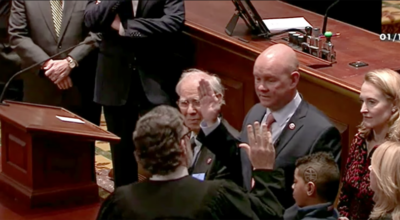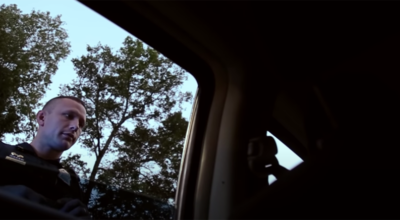
Defendants, witnesses and attorneys mill about on the second floor of the county courts building in downtown Chattanooga. Police and deputies prosecute ”failure to have insurance” on the floor as if the law were different than it is in Tenn. Code An. § Tile 55, chapter 12. (Photo David Tulis)
David Jonathan Tulis Affidavit of Mistake
Rescission of authority of signature on entry into privileged occupation of driving
David Jonathan Tulis, being of sound mind and body, testifies that he lives in Hamilton County, Tenn., and hereby testifies of his mistaken understanding of his rights, and of his remedying these errors with a correct understanding of these constitutionally guaranteed rights and how to assert them.
This affidavit accounts for how affiant mistakenly yielded his rights under error, deception and delusion, and how he herein acts to rectify these errors by rescission of the authority of his signature on state-proffered documents.
[I am in an administrative court case in which I attack maladministration and oppression out of the departments of revenue, safety and insurance whose commissioners, acting in personal capacity under mere color of law, pretend that T.C.A. § 55, chapter 12, the financial responsibility act of 1977, requires all users of the road to have insurance coverage at all times. The law and the court cases don’t say that. We are an after-crash state requiring proof of financial responsibility 20 days after a qualifying crash. I also will be defending the right of travel in this case, the right to be a nontaxpayer, not involved in the privileged activity supervised by revenue, safety and your local poaching cop. This affidavit contains a conditional revocation of signature on the application forms for motor vehicle registration and driver’s license, which authority I will revoke if I cannot prevail on the exercise of two parallel rights — the right to travel and the right to use the roads in commerce, under state privilege, as a driver. No one can be forced to choose the exercise of enjoyment of one right and the expense of another. That is exactly what operators of commercial government are doing against me — and the 7 million rest of us Tennesseans.]

How mistake came about
- In childhood and in teen years, people of authority said that it is essential for one to have a driver license to use a car, and said in various ways that it is illegal, wrong, unjust, and a crime to use the road apart from the having of the state’s privilege and its license.
- These instructions to the affiant through his teen years led him to believe that there is no right to travel and freely communicate by car, truck or motorbike.
- These authority figures include mother, father, public school teacher, elder and religious institution, Sunday school teacher, older children who had gotten permits to drive, adult licensees of the department of safety and homeland security, officials quoted in media, reporters telling readers and listeners and viewers about police enforcement activities, accounts in the press about car accidents and police enforcement on the roads, among others.
- The mistaken understanding is this: That it is illegal and unlawful for affiant to get behind the wheel of a car or truck, turn on the Ignition switch, press his foot upon the gas pedal, make the car go forward on driveway and public road, and proceed to travel down the people’s road and freeway to a destination.
- It was his understanding that such an act was a crime, and that it was just for any police officer to criminally charge him or any person in such an activity. It was his understanding that such a person should be found guilty in court, either by the judge or by a jury, and that such person is a malefactor and a criminal who owes a debt to society either by fine, punishment or prison.
Affiant obtains correct view of rights of communication
- Since that time, affiant has learned about his rights.
- He has reviewed the Tennessee constitution, the U.S. constitution, and also reviewed Tennessee law and court cases as regards his rights of communication and personal movement and the disabilities in the state’s motor vehicle law.
- Affiant understands that the moving of his body and person and personal effects and goods from any one point of a map to another point of a map is a matter of right under the rubric of communication, that it need not be through the exercise of a taxable state privilege pursuant to Tenn. Code Ann. Title 55 or 65 regarding carriers.
- Communication is simply the affiant’s dealing with other people in society, whether they be friends, families, rivals, competitors, sales prospects, business partners, activist associates, political activists, party leaders, university professors, students, instructors, experts, politicians, fellow voters, fellow members of a tribe or religious denomination, or others.
- The word communication entails the use of means to express oneself and to obtain expressions from other people. These means include the U.S. mail, the telephone, email, the Internet, and also the physical movement of his person and effects from one place to another. He can go from point A to point B bodily, in his natural person, in his persona propria, sui juris, in the exercise of his God-given constitutional, inherent and unalienable rights.
- The affiant has learned that to exercise his rights, he must involve himself in communication with other people. That includes going by car or personal mode of travel to see and visit them.
- The freedom of seeing other people is called free association or the exercise of the right of association. That is a right under Tenn. const. Art. 1, sect. 23. There are other rights as well, affiant declares.
- These rights include the right to petition for redress of grievances, the right to exercise the franchise of the vote, the right to participate in political activity, the right to participate in religious activity of worship of God; the rights of the press under Tenn. Const. Art. 1, sect. 19; the right of bearing arms, which means the right of moving his weapons from point A to point B; the right of marriage and the liberty to go to and from a place of marriage and to and from a place of celebration of marriage; the right to creative acts in the arts, whether visual or figurative, and the necessity to travel in the creative process; and many other rights too many to enumerate.
Rescission of signature
- Given that he has been misled about these God-given liberties, he hereby rescinds the authority of his signature on every document presented by state of Tennessee and its agents in application for any appurtenance relating to the calling, avocation, trade or occupation called driving or operating a motor vehicle.
- He rescinds the authority of these signatures under mistake and error on his part, whether on the part of the opposite party by fraud, deceit, harm, conniving or by honest language, honorable intent, lawful discourse he is not entirely sure.
- His calling, avocation, trade or occupation as a member of the press are other than that of operating a motor vehicle, and thus he absolutely and forever rescinds his signature on these various earlier applications, whether they be for a driver license with the department of safety, or to register a car as a motor vehicle with the department of revenue and its local agent, the county clerk.
- This rescission of signature is conditional on results of a state employee challenge to affiant’s use of a car under driver license or license plate.
- If these employees succeed with colorable claims that affiant’s right to drive and operate a registered motor vehicle is simultaneously an admission that he yields, waives and surrenders enjoyment of the underlying federal right to communicate and travel freely, then affiant declares this affidavit operative, and all signatures of application void and null, as they are obtained under mistake and fraud.
Further affiant sayeth naught. I swear the above and foregoing representations are true and correct to the best of my information, knowledge and belief.

